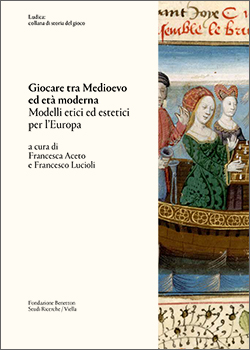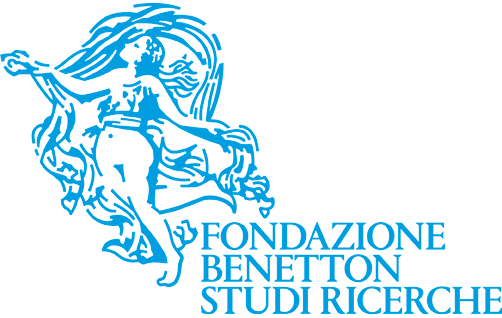
Giocare tra Medioevo ed età moderna
Modelli etici ed estetici per l’Europa
[Games and gaming from the Middle Ages to the modern age. Ethical and aesthetic models for Europe]
edited by Francesca Aceto and Francesco Lucioli
Fondazione Benetton Studi Ricerche-Viella
Treviso-Rome 2019
248 pages
49 illustrations in black and white and 23 in colour
cover price 35 euros
ISBN 978-88-3313-278-5
(Ludica, 14)
The book is available in bookstores and in e-books
Giocare tra Medioevo ed età moderna. Modelli etici ed estetici per l’Europa (Games and gaming from the Middle Ages to the modern age. Ethical and aesthetic models for Europe) edited by Francesca Aceto and Francesco Lucioli, is a collection of studies connected to the international conference held in Treviso on 17 and 18 November 2017 and organized by Fondazione Benetton Studi Ricerche in collaboration with the Centre de Recherches Historiques, Paris di (CHR, EHESS) and the School of Languages, Cultures and Linguistics of University College Dublin.
The essays published here offer a new reflection – one that is also historiographical – on the ethical function attributed to ludic activities from the Middle Ages to the modern age, on their numerous forms of expression and representation, and on the ways in which games and gaming were interpreted and used in moral terms.
The imitative function of games, their ritual nature, and their openness to symbolic interpretation invited moralists and preachers to reflect on how ludic activities could model the lives of young people – both physically and spiritually – in the context of the providential economics of social life.
The study of games and gaming from the Middle Ages to the modern age involves exploring the history of an extraordinary cultural experience involving both morality and religion, morality and politics. In fact, games could be played outside, inside, in the daytime or at night; and the entire social body appeared to be compromised by an innate unstoppable passion for games that required regulating.
The book dwells on the relational dynamics between men, women, and games, analysing the spaces, times, and modes of access to games in the long period from the medieval theorization of eutrapelia to Jesuit reflections on the education of the young. In fact, the analysis of phenomena of great anthropological interest – like ludic activities – should be carried out within a broader perspective in order to study general points of view that will prove capable of identifying structural elements with a long-term impact that are indicators of significant changes in the social, institutional and cultural framework of both medieval and modern societies.
Contents
Francesca Aceto e Francesco Lucioli, Introduction
Paolo Garbini, Conjugation of the verb giocare. Grammarians and games in the Mediaeval Latin
Carla Casagrande and Silvana Vecchio, Vices and virtues of game-playing: eutrapelia from the 13th to the 15th century
Antonella Fenech Kroke, “Mattaccin tutti noi siamo.” Acrobatic games and bodily contortions from the Middle Ages to the Renaissance
Francesca Aceto, “The spiritual recreation of the good surveyor.” Notes on ludicity, the arts and sciences in the 15th and 16th centuries
Alessandra Rizzi, Church, games, and social interactions in the Renaissance, with a Venetian gloss
Amedeo Quondam, Courtly games
Francesco Lucioli, Courtly game and morality in the Innamoramento di Ruggeretto by Panfilo de’ Renaldini
Paolo Procaccioli, Towards the Index and the decline of libri di sorti. From Lorenzo Spirito to the Oracolo by Girolamo Parabosco
Alessandro Arcangeli, Gender of games and games of gender in the ludic culture of the Renaissance in Europe
Umberto Cecchinato, Dance, gender attitudes and courting in the Renaissance
Gherardo Ortalli, Young people, ethics, games: the scholastic teaching of the Society of Jesus and the Lezioni by Cesare Calini (1713-1720)
Bibliography
Summaries
Notes on the Authors
Ilustration references
Index of names and places
Francesca Aceto. After graduating in the humanities at the Università La Sapienza di Roma, Francesca Aceto obtained PhD in history at the École des Hautes Études en Sciences Sociales, Paris (EHESS). Since 2016 she has been scentific correspondent for the Groupe d’Anthropologie Historique du Long Moyen Age (AHLOMA, Paris). She has taught history, art history and historiography at the universities of Paris 7 (Paris Diderot), Paris 5 (Paris Descartes) and Lille 3. Her research interests range from the history of science and education to the history of art and of Italian literature from the 14th to the 16th century, with a particular focus on the social and cultural aspects of ludic practice between the Middle Ages and modern age. In 2015 she organized the international conference Jeux éducatifs et savoirs ludiques dans l’Europe médiéval in collaboration with the Institut historique allemand Paris (IHA) and the Centre de recherche historique (CRH, EHESS). The conference proceedings were published by the Fondazione Benetton Studi Ricerche (Ludica, 21-22, 2015-2016 and 23, 2017). She lectures in Italian history, language and culture at the university of Lille 3 (2019 onwards).
Francesco Lucioli is Assistant Professor in Italian Studies at University College Dublin. His main area of interest is Renaissance Italian literature in both Neo-Latin and the vernacular. He has carried out research into chivalric poetry and the reception of Orlando furioso, the art of memory, of conduct literature for women, the relationship between literature, morality, and the visual arts. He has published the following monographs: Amore punito e disarmato. Parola e immagine da Petrarca all’Arcadia (Sapienza Università Editrice, Rome 2013), and Jacopo Sadoleto poeta e umanista (Roma nel Rinascimento, Rome 2015). He has also edited the modern edition of the treatises of the Instituzione d’ogni stato lodevole delle donne cristianeby Agostino Valier (Modern Humanities Research Association mhra, Cambridge 2014) and Giuliano Dati’s treatise in ottava rima Aedificatio Romae (Roma nel Rinascimento, Roma 2012).
The volume contains contributions by: Francesca Aceto, Alessandro Arcangeli, Carla Casagrande, Umberto Cecchinato, Antonella Fenech Kroke, Paolo Garbini, Francesco Lucioli, Gherardo Ortalli, Paolo Procaccioli, Amedeo Quondam, Alessandra Rizzi, Silvana Vecchio.
